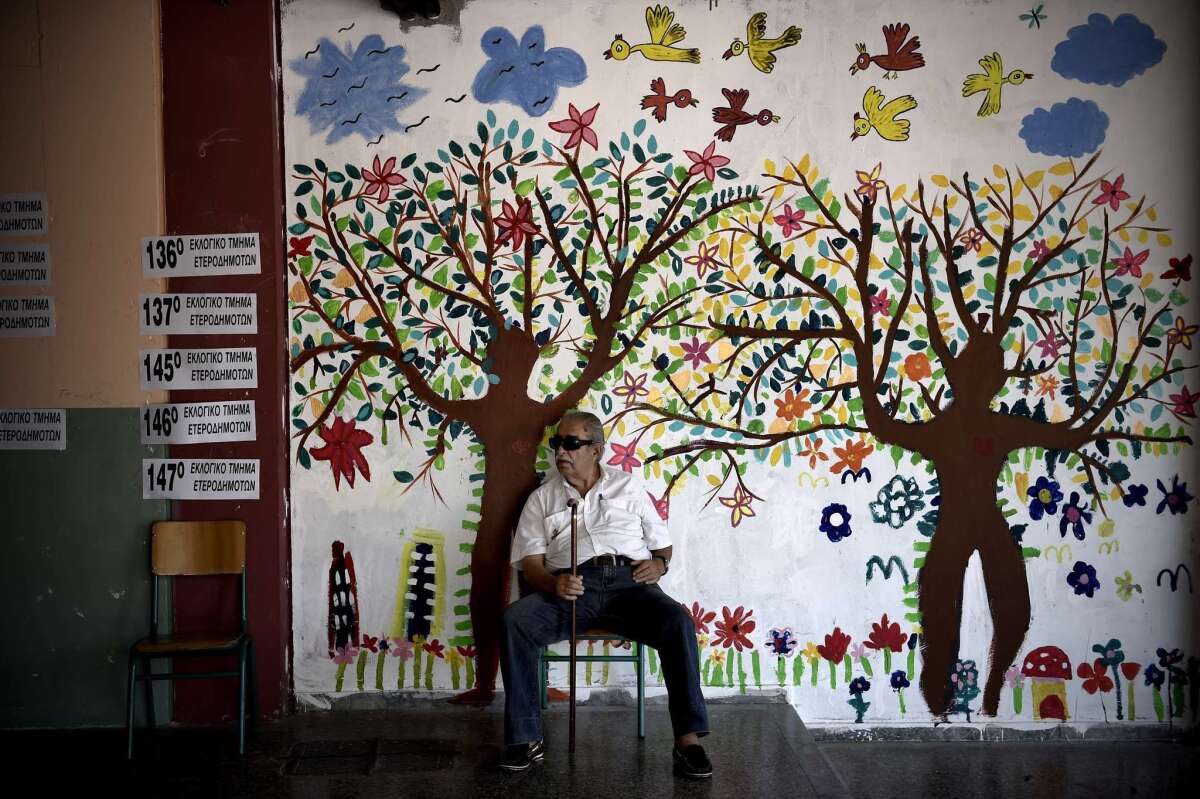In Greece, ex-premier’s Syriza party wins election

A man sits at a polling station in central Athens on Sunday.
Reporting from London — Despite a spectacular U-turn on austerity, former Prime Minister Alexis Tsipras scored a victory at the polls in Greece on Sunday, with his left-wing Syriza party once again set to capture the most seats in Parliament.
But it fell short of a majority in the 300-seat body, meaning that it will have to govern in a coalition whose looming challenge will be to implement the harsh cuts and difficult reforms demanded by Greece’s latest international bailout.
With 99.4% of the votes counted, Syriza was winning nearly 35.5%, ahead of conservative opposition party New Democracy, which garnered 28%. To the consternation of many, the third highest vote-getter, at just under 7%, was Golden Dawn, a thuggish, neo-Nazi-like group whose leaders are on trial for running a criminal organization and whose members have been accused of beating up immigrants.
Sunday’s election was the third time in eight months that Greeks cast ballots in a national election. The sense of political fatigue was evident: Voter turnout fell short of 57%.
Many Greeks still feel weary and disenchanted by events this summer, when their country came close to a chaotic default and possible ejection from the 19-nation Eurozone. To avert it, Tsipras agreed to a nearly $100-billion bailout entailing austerity cuts and tax hikes of the kind he vowed to reject when he won power in an election in January.
Tsipras, 41, even called a national referendum on austerity in July and urged Greeks to join him in voting no, which they did by a landslide. But days later, he reversed himself and agreed to the bailout after marathon negotiations with his European counterparts.
Angry lawmakers within Tsipras’ party voted against the deal — which passed only with the support of opposition parties — and broke away to form a splinter group. The rebellion led to an unstable government that Tsipras said could not continue in its present form.
Ironically, the new coalition he is expected to form over the next day or two will probably look remarkably like the previous one, a somewhat strange alliance between Syriza and the right-wing Independent Greeks party.
Syriza’s victory came after polls showed New Democracy narrowing the gap; some commentators had said the race was too close to call. But many undeclared voters apparently decided to give Syriza another chance, despite Tsipras’ acquiescence to the new bailout, Greece’s third international rescue package in five years.
“I feel vindicated because the Greek people gave us a clear mandate to continue our struggle,” Tsipras told jubilant supporters Sunday night, calling the outcome a “great victory.”
Euclid Tsakalotos, the finance minister who negotiated the bailout deal, said that Greeks could now count on a more stable government.
“I can’t say that it will be a government for four years,” he told Greek television, “but I can say that it is very unlikely that there will be elections in the next 12 months.”
The election campaign was much more subdued in comparison with the race in January that vaulted Syriza to power. Tsipras appealed to his compatriots to give him a strong mandate to reform Greece, to take on the entrenched interests and corruption that have beset the debt-ridden Mediterranean nation.
His opponents accused his government of inexperience and incompetence, with the plain-speaking leader of New Democracy, Vangelis Meimarakis, scornfully calling Tsipras “kiddo” and a “little liar.”
Greeks “want to do away with … the lies, the misery,” Meimarakis said Sunday. “With their vote they want to bring truth and authenticity.”
Despite being spared bankruptcy and ejection from the Eurozone, Greece continues to languish in economic despair. Since Athens’ debt crisis erupted six years ago, the economy has lost a staggering 25% of its value, and a quarter of the workforce remains out of a job. Homelessness and suicides have increased.
Anger over the crippling austerity imposed by Greece’s lenders fueled the rise of Golden Dawn. Both Syriza and New Democracy said they would refuse to work with the far-right group in any coalition resulting from the election.
Popular Unity, the new party formed by Syriza dissidents, appeared to fall short of the 3% vote threshold needed to enter Parliament.
Follow @HenryHChu on Twitter for coverage of Europe.
ALSO
U.S. to take in more refugees, Kerry says
Islamic State has a message for Muslims hoping to go to Europe
Thousands of migrants reach Austria as hordes remain trapped by European infighting
More to Read
Sign up for Essential California
The most important California stories and recommendations in your inbox every morning.
You may occasionally receive promotional content from the Los Angeles Times.











